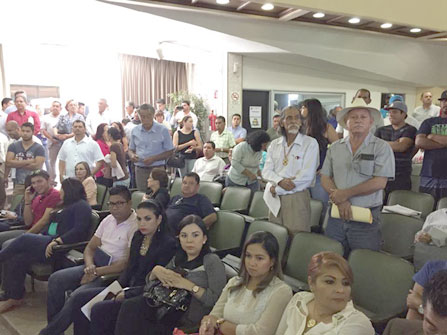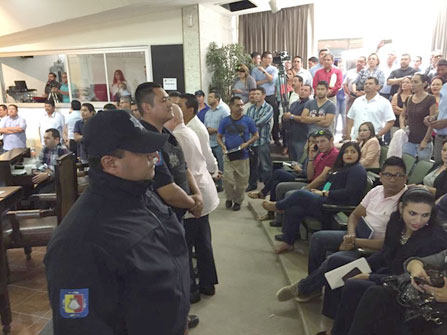New legislation passed in Baja California Sur further enables expropriations
LA PAZ

In a turbulent session, Congress approves the LAPP. (Photo: Frente Ciudadano en Defensa del Agua y la Vida).
Because of an unusually large voter turnout by legislators from the National Action Party (PAN) as well as the presence of the police inside the building, dozens of protesters were unsuccessful in their attempt to prevent the Baja California Sur State Congress from passing the Public-Private Partnership Law (LAPP).
In advance of the vote, the Citizen’s Front for the Defense of Water and Life [el Frente Ciudadano en defensa del Agua y la Vida] began an information and petition campaign in support of a document criticizing what is being characterized as the Mendoza Law to dispossess Baja California citizens. They later presented the document and petition signatures to Congress in order to demonstrate that a large sector of the public is not in agreement with the proposed law. The law was finally passed with the 13 votes of the PAN delegates and two from the Renovación Sudcaliforniana Party.
The group's petition—to be heard, to hold a public referendum, and to reject the governor’s proposed law—was ignored by both legislators and the Commission on Fiscal and Administrative Issues of the State Congress, even though it included more than 2,000 signatures.
Passed on June 8, LAPP is Gov. Carlos Mendoza Davis’ pet initiative and a faithful copy of the federal law of the same nature. It is a public security law with the objective of “regulating the development of projects by Public-Private Associations in the state of Baja California Sur such that municipal and state governments can undertake projects with private, national, and foreign businesses.

Citizens' demands to be heard were ignored. (Photo: Frente Ciudadano en Defensa del Agua y la Vida).
It provides a legal framework for long-term projects, including private sector provision of services to the public sector or the end user. It also provides for public infrastructure projects totally or partially undertaken by the private sector to increase investment in the state.
The proposed projects under this act must show their cost benefits as compared with other financing options, which should not be difficult since an investment and technological development fund is being created that guarantees success, and it will be strengthened by the backing from institutions such as the Foreign Trade Bank and others dedicated to the tourism sector.
The first law of this type was created during the Felipe Calderón Administration in January 2012. Its objectives were to improve public welfare and increase investments in the country, after which an avalanche of investments in highways, specialty hospitals, and city government, and other infrastructure occurred. It even served as the basis for the development of the Energy Reform Law, which to date has yet to show its promised social benefits.
Citizens who rejected the LAPP in Baja California Sur warn that this law will increase the number of investments that put the state and environment at risk. They rally with: “SAY NO TO MENDOZA’S LAW OF DISPOSSESSION OF SOUTHERN BAJA CALIFORNIANS!” (the Public-Private Partnership Law). THIS LAW AFFECTS US ALL! If you are a rancher or grower they can expropriate your land to develop a public-private project; if you are a fisher, they can take away your concession rights in order to develop a public-private project like what could become the Don Diego mine; if you are a home owner within the area where they want to develop a private-public project, they can take away land from you and your neighbor under the doctrine of eminent domain. If you own trucks, boats or other machinery and they need them to develop a public-private project, they can expropriate your property (…).”

In what was seen as an arbitrary and unecessary move, state police were called in to the congressional hall. (Photo: Frente Ciudadano en Defensa del Agua y la Vida).
And just like with the Energy Reform Act, private property can be expropriated in the public interest if the owners don’t accept the settlement they are offered. Article 88 of the LAPP states that “the adquistion of such real estate, goods and rights will be made through a conventional route or through the expropriation of private property.”
The political parties, including PRI, del Trabajo, the Revolución Democrática, and the Movimiento de Regeneración Nacional, all voted against the law, but only had 6 seats total. On expressing their discontent, they stated that the Act was a grievous antidemocratic intrusion and an abuse of discretion, that it made a mockery of the citizens of Baja California Sur, and that it was a coup of the State Legislature.” At the same time, they consider that the law “is null and void because legislative procedures weren’t followed. For example, any time a claim is made stating there is an urgent need to pass a law and therefore the second reading of the law should be waived, that claim must be substantiated,” (it wasn´t) and so the law was illegitimate from the very start.
“People in Congress and the statehouse are already saying that for 2017, more than one-third of the budget will go towards financing public-private partnership businesses.” Meanwhile, citizens and political parties are announcing that they will be filing new legal actions to prevent the law from taking effect.
In a press release, PAN responded, saying that the goal of the law is to increase confidence in private investments and to establish new financing mechanisms for public works “with a high social content in Baja California Sur that benefits all sectors of the population.”
In Baja California Sur, there are currently a number of conflicts because of plans for mega tourism and industrial developments. Among these are projects in Todos Santos and Cabo Pulmo, as well as mining investments such as the Gulf of Ulloa deepwater mine and other terrestrial mines like the open-pit gold mine in the Sierra la Laguna Natural Protected Area.
